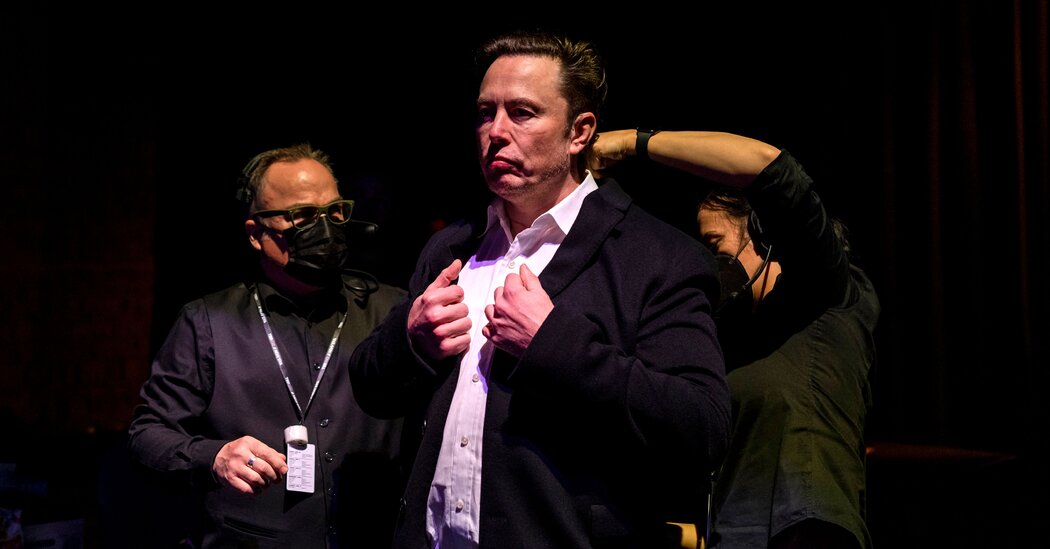
Twitter is “the digital town square, where matters vital to the future of humanity are debated,” a triumphant Elon Musk proclaimed in announcing his deal to buy the social media platform.
In other words, Twitter is no ordinary corporation. It serves as something akin to a public utility, a unique global means of communication.
So should Twitter be governed like a conventional public company, with a board of directors focused primarily on reaping the greatest amount of money possible for shareholders, with little regard to the interests of other groups?
In the eyes of some influential business and legal experts, the answer is no. The company’s directors should have also evaluated the qualifications of Mr. Musk to serve as a responsible steward for a vital public communications channel — and, based on the public comments made by Twitter’s board of directors, there is no evidence that it did so.
“The board should have considered the interest of stakeholders like employees and users in evaluating the long-term value of the company,” said Lenore Palladino, associate professor of economics at the University of Massachusetts, Amherst, and a fellow at the progressive Roosevelt Institute in New York.
Mr. Musk is a polarizing figure. He is a world-changing entrepreneur, responsible for companies, like PayPal and Tesla, that have revolutionized enormous industries. He has used his considerable influence — he has 85 million Twitter followers — to inveigh against what he sees as a censorious liberal culture in technology and media.
He is also at times reckless and capricious — traits that have landed him in trouble with federal regulators and on the receiving end of a defamation lawsuit, among other troubles. Just last week, he mocked Bill Gates’s beer belly after the Microsoft co-founder was said to have bet against Tesla’s stock price.
The question is whether any of that actually or should have factored into the decision by Twitter’s board of directors to sell the company to Mr. Musk.
In recent decades American corporations and their boards have operated under a legal doctrine known as “shareholder primacy,” which posits that corporate boards should focus on a single goal, which is maximizing returns to shareholders.
Bret Taylor, Twitter’s chairman, hewed closely to that doctrine on Monday when he said that the board had evaluated Mr. Musk’s offer by focusing on “value, certainty and financing” and that the deal would deliver a “substantial cash premium.”
He might as well have been talking about a tool-and-die manufacturer.
There wasn’t even lip service paid to Twitter’s other stakeholders — its users, employees and advertisers, to name a few — or its profound importance to public discourse. It’s unclear whether the board members, in what appears to have been a whirlwind weekend of deliberations, even touched on these topics.
Under current law, mostly established by Delaware courts, boards have “the discretion but not the obligation” to consider the interests of people other than their investors, said Jill Fisch, a professor of business law at the University of Pennsylvania Carey Law School. But few, if any, have exercised that discretion, she said.
In recent years, this shareholder primacy model has come under attack from critics who contend it has enriched shareholders at the expense of just about everything and everyone else: workers, customers, innovation, the planet.
“Corporate leaders and practitioners have been increasingly pledging to pay close attention to the interests of stakeholders, such as customers or society in the case of Twitter, and not only shareholders,” said Lucian Bebchuk, a professor at Harvard Law School. Even so, a study of more than 100 recent $1 billion-plus deals that Mr. Bebchuk recently completed found that there had been little impact, with “large gains” for shareholders and corporate leaders and little or nothing for other constituencies.
The Twitter situation shows how “we need to fundamentally change the approach to corporate governance,” said Ms. Palladino, the Massachusetts professor.
Mr. Musk has said he isn’t buying Twitter to make money (even as he claims that he has plans to “unlock” the company’s potential). That is arguably cause for concern. Public shareholders, like any other owner seeking to maximize profits, have a financial incentive to attract and maintain the broadest number of users. That means management needs to bar extremists, in order to avoid offending or driving away many more users, while seeking to prohibit as few others as possible, in order to increase the platform’s value to advertisers.
How Elon Musk Bought Twitter
A blockbuster deal. Elon Musk, the world’s wealthiest man, capped what seemed an improbable attempt by the famously mercurial billionaire to buy Twitter for roughly $44 billion. Here’s how the deal unfolded:
On the other hand, it leaves the company’s management hostage to the whims of Wall Street, whose interests may not be well aligned with those of the broader public.
Since his takeover bid became public earlier this month, Mr. Musk has been talking up his plans to promote Twitter as a bastion of free speech. On Monday, he said he hoped that “even my worst critics remain on Twitter, because that is what free speech means.”
While Mr. Musk’s public comments so far have been soothing to champions of free expression, especially those on the right who claim that Big Tech has silenced conservative viewpoints, there’s no guarantee that Mr. Musk will continue to espouse those broad-minded views once he’s in control.
Having forsworn the profit motive, Mr. Musk might not care whom he offends, either by welcoming extremists or by banning people who denounce him. This is a man who once called a rescue worker a “pedo guy” after the worker criticized Mr. Musk. He has been careful not to say where he would draw the line between free expression and hateful or violent speech, which Twitter’s existing management has, with a notably imperfect record, tried to curtail.
In one sense, it’s easy to sympathize with the eagerness of the Twitter board to get out of this hornet’s nest while enriching shareholders. Turning down a takeover offer at a premium to the company’s current share price would have been a recipe for litigation. Accepting the bid was the path of least resistance, and Ms. Fisch said it was unlikely to be successfully challenged in court or held up by federal regulators.
On the other hand, there’s far more at stake with Twitter than in a normal corporate transaction (though you could make a similar argument about CNN, whose parent company was acquired this month by Discovery Inc., or for that matter any other company that purportedly serves the public interest).
Perhaps Mr. Musk will prove a fine steward of the digital town square he will soon own; it’s certainly plausible that the board, if it had seriously considered the likelihood that Mr. Musk would meddle to suit his ideology or personal interests, would have concluded he was a relatively safe pair of hands. After all, it’s not as if Twitter, in its current cacophonous state, is some utopia of mild-mannered civic discourse.
But the board’s response to Mr. Musk need not have been based on any subjective evaluation of his character or motives.
As Ms. Palladino points out, the board could have taken the position that serving the public interest matters most to Twitter’s long-term value, and that selling Twitter to any single, private buyer wasn’t in the interests of anyone other than short-term speculators and Mr. Musk himself.




